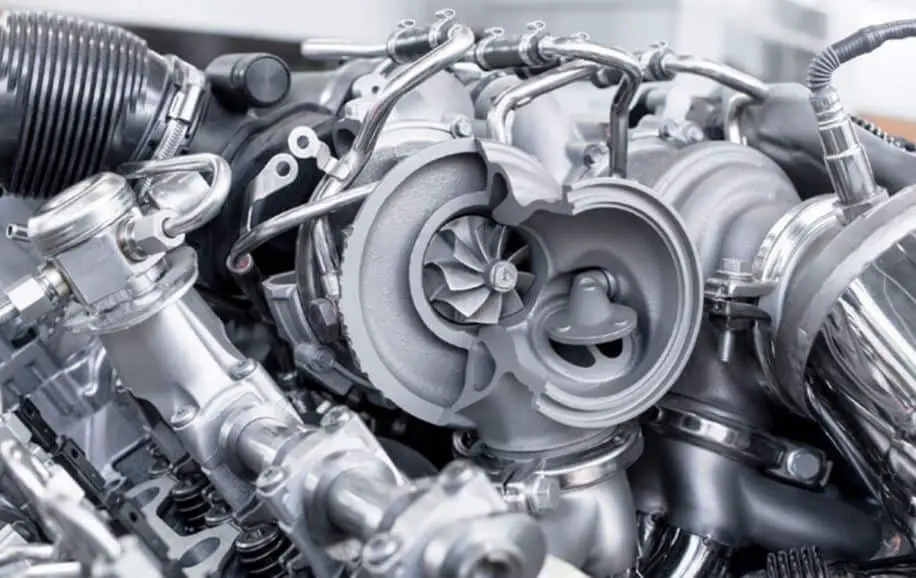You may have heard that the 2.7 GM Turbo engine has several faults, and if you’re considering buying a car with this engine, it’s crucial to be aware of these possible drawbacks.
Many problems with the GM 2.7 turbo engine have been raised, including its poor fuel efficiency, limited availability, low horsepower, carbon buildup in the engine, troubles with the fuel injectors, and sporadic timing belt and head gasket problems.
These issues, however, are less serious than you may have thought, and some of them can even be handled with the right upkeep and attention. Let’s examine the reasons for the criticism leveled at the 2.7 Turbo engine.
Due to several difficulties, including poor fuel efficiency, limited availability, low horsepower, engine carbon buildup, problematic fuel injectors, and sporadic timing belt and head gasket troubles, GM’s 2.7L Turbo engine may have a negative reputation. These issues are often not as serious as they seem to be.

Poor Fuel Economy
It’s crucial to understand that the GM 2.7 Turbo engine still has lesser fuel economy compared to other models in its class, even if driving habits, vehicle weight, and maintenance routines may all affect fuel efficiency. This may be concerning for people who want to travel great miles with their car.
Considering a vehicle’s fuel economy is crucial when estimating long-term ownership costs. Poor fuel efficiency may eventually result in higher gasoline expenditures that may be more expensive than the initial savings from choosing a less expensive automobile.
Considering models with superior fuel efficiency is worthwhile if you travel long distances and wish to reduce gasoline costs while boosting sustainability. Doing this may increase your cost savings and improve your driving experience.
Low Availability
The 2.7L turbo engine is reportedly less readily available than other engines. This problem might be partly ascribed to the engine’s high demand because of its dependability, despite its low power and poor fuel efficiency.
The current chip scarcity has also greatly affected the automobile sector, causing manufacturing delays and decreased availability of practically all cars. Consequently, rather than being a problem with the engine itself, it is more related to supply and demand.
Low Horsepower
This may seem like an unusual “flaw” given that the engine’s horsepower capacity is well known. Still, it’s important to remember that the GM 2.7 Turbo engine is renowned for having a low horsepower output.
Although the 310 horsepower this relatively little engine generates isn’t awful, it isn’t the best choice for a big vehicle like the Sierra or Silverado. However, this engine will still be able to provide enough power for regular driving demands for the majority of consumers.
Engine Carbon Buildup
In direct-injection engines, particularly the GM 2.7 turbo engine, carbon accumulation is a frequent problem. This issue arises when carbon buildup develops on intake valves and other engine parts.
Maintaining a regular engine cleaning schedule, using high-quality gasoline, and thinking about employing fuel additives that break carbon deposits are all essential for preventing carbon accumulation. Routine oil changes and air filter replacements may also maintain the engine’s cleanliness and efficiency.
Fuel Injector Problems
Another issue with the GM 2.7 Turbo engine is issues with the fuel injectors. These problems may be caused by carbon deposits that develop on the fuel injector tips and cause partial or total obstruction. Clogged fuel injectors have a long-term detrimental effect on emissions, fuel economy, and engine performance.
Implementing many maintenance procedures to handle and avoid fuel injector problems is essential. Utilizing high-quality gasoline is crucial because it helps prevent the buildup of carbon deposits. Additionally, including gasoline additives for cleaning injectors will help keep them clean and avoid obstructions.
Additionally, you may utilize a fuel injector cleaner or arrange for routine fuel injector cleaning services. This maintenance often entails cleaning the injectors of carbon buildup and other pollutants using specialist tools and chemicals, restoring their functioning, and assuring peak engine efficiency.
Timing Belt and Head Gasket Issues
Some owners of GM 2.7 turbo engines have experienced timing belt and head gasket failure. However, these issues are quite uncommon (around 4%, to be precise). Such problems may be found and avoided with routine engine maintenance and component examination. The engine’s lifetime and head gasket failures may be decreased by replacing the timing belt at the manufacturer’s suggested intervals and using the right coolant.
2.7 GM Turbo Specs
The 2.7L GM Turbo engine is a four-cylinder, turbocharged gasoline engine created by General Motors. Its official name is the 2.7L L3B I4 Turbo. It originally debuted in 2018 as a GM Ecotec engine family member. It has since been used in various GM vehicles, including pickup trucks like the Chevrolet Silverado 1500 and GMC Sierra 1500.
The 2.7L GM Turbo engine has a 16-valve arrangement, a dual overhead camshaft, an aluminum block, and head construction. This engine uses direct fuel injection and a turbocharger, which (to a certain degree) enhances performance and fuel economy. At 5,600 RPM, the 2.7-liter engine can generate a maximum of 310 horsepower, and between 1,500 and 4,000 RPM, it can generate 348 lb-ft of torque.
GM’s 2.7 Turbo Engine: Is It Reliable?
When kept up correctly, the GM 2.7 Turbo engine’s dependability is often above average. While it has sometimes been known to encounter difficulties with the timing belt and head gasket, carbon buildup, and fuel injectors, these problems are rare. They are often manageable or even preventable with the right care and maintenance.
Despite its “complicated” construction (because of the turbo and direct fuel injection), the GM 2.7 Turbo engine can provide a dependable and pleasurable driving experience for many drivers when regular maintenance is performed, high-quality gasoline and additives are used, and any problems are swiftly resolved.
Conclusion
The 2.7 turbo engine from GM has certain issues, but they may seem more serious than they are. Many of these problems may be reduced or completely avoided with careful maintenance, care, and attention to driving patterns, making the engine a dependable option for various drivers.

